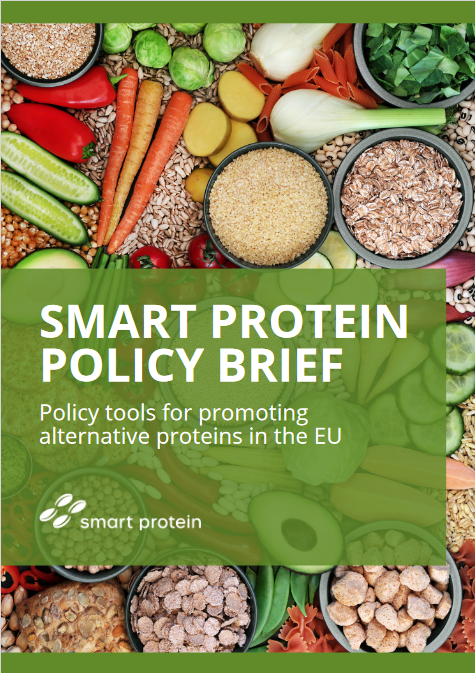Europe moving towards more plant-based food consumption
The EU-funded Smart Protein project published a report detailing the necessary measures the EU needs to adopt to partially replace animal agriculture with plant-based diets.
Although a significant 40% of Europeans identify as flexitarian, pescatarian, vegetarian, or vegan this percentage will need to rise as the food system diversifies from animal agriculture to aid climate change. To shift more Europeans to a plant-based diet, the EU-funded Smart Protein project has published a new report looking at the necessary measures that the EU needs to adopt.
“It is vital that the EU focuses on implementing policies that promote more climate-friendly food,” Juliette Tronchon, ProVeg International’s Senior Policy and Public Affairs Specialist and co-author of the report, said.
The Smart Protein report highlights that the promotion of plant-based food innovation and the transition towards more plant-rich diets can provide a key multi problem solution in the context of climate change and endangered food security. It has been a regular topic of SIAL to highlight the necessity to find alternative solutions for a more sustainable agri-food sector.
Plant-based alternatives to meat and dairy, along with plant-based whole foods and plant-based diets in general tend to have a much lower environmental footprint than their animal-based counterparts.
Replacing animal-based products with vegetable products has the potential to reduce product-related emissions by up to 90%. An overall shift to more plant-rich diets can reduce annual agricultural emissions in high-income countries by as much as 60%.
Conventional livestock farming requires high levels of natural resources such as land and water to feed animals. Around 80% of global agricultural land is used for livestock farming, although it provides less than 20% of the global calories’ supply, highlights the report.
Plant-based foods tend also to be more resilient in the face of the impact of climate change and supply-chain disruptions, thus reducing the risk of food insecurity. Furthermore, as the Smart Protein project demonstrates, nutritious vegetable foods can be produced from food-industry ‘waste products’ such as pasta residues and side streams from beer production.
The Smart Protein Policy Brief calls on the European Commission to progress on policies covering four key areas: labelling and marketing, public food procurement, VAT rates and subsidies.
Plant-based consumption is up in Europe
There have been changes in the way Europeans consume food according to research from Smart Protein, which analysed retail data from 11 European countries to determine how much plant-based consumption increased between 2018 to 2020.
According to the research results, Europe’s plant-based food industry grew an astonishing 49% overall in that 2-year period, amounting to a total sales value of EUR 3.6 billion. The vegetable categories analysed were meat, milk, yoghurt, cheese, ice cream and fish, depending on the availability in each country.
The report shows a huge increase in the sales value of plant-based meat over 2 years, with the biggest growth coming from Germany (226%), followed by Austria (82%). The only recorded drop in plant-based meat sales was in Italy (-10%). Germany, the only country with figures for “vegetal” fish, showed a 623% increase in sales value, from EUR 251,000 in 2018 to EUR 1.9 million in 2020.
Milk alternatives are more widely accepted and enjoyed the fastest growing category in most of the countries, with oat milk sales leading the sector. Double-digit growth in the sales value of plant-based plain milk was reported in Poland (76%) and Romania (73%), with discounters in the 2 countries achieving 126% and 316% growth, respectively. The Netherlands took the lead in vegetable cheese sales, with a growth rate of 400%. In Belgium, the sales value of plant-based (soy) yogurt grew an astonishing 497%.
The Smart Protein report stresses that more funds should be made to research alternative proteins beyond the current €32 million of funding earmarked for sustainable protein under the EU’s Horizon Europe programme.
“Alternative proteins, such as plant, microbial, or marine proteins, is one of key areas of research for a sustainable, healthy and inclusive food system. The aim is to stimulate food consumption that is sustainable in both health and environmental aspects, highlighting the importance of plant-based diets. Smart Protein is providing key information to fill knowledge gaps on alternative proteins and contribute to achieve the objectives of the European Green Deal,” Cindy Schoumacher, Policy Officer at the European Commission DG Research and Innovation, said when commenting the report.
At SIAL Summits, environmental responsibility will be again a major topic of discussions.
(Top photo: vegan meal- Ula Zarosa, CC BY 2.0 https://creativecommons.org/licenses/by/2.0, via Wikimedia Commons)
Join us at SIAL Paris as exhibitor Join us at SIAL Paris as visitor

